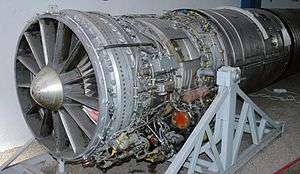Lyulka AL-7
| AL-7 | |
|---|---|
 | |
| Lyulka AL-7F turbojet engine at the Polish Aviation Museum | |
| Type | Turbojet |
| Manufacturer | Lyulka |
| First run | 1952 |
| Major applications | Sukhoi Su-7 Sukhoi Su-9 Sukhoi Su-11 Tupolev Tu-28 Beriev Be-10 Kh-20 |
|
| |
The Lyulka AL-7 was a turbojet designed by Arkhip Mikhailovich Lyulka and produced by his Lyulka design bureau. The engine was produced between 1954 and 1970.[1]
Design and development
The AL-7 had supersonic airflow through the first stage of the compressor. TR-7 prototype developing 6,500 kgf (14,330 lbf, 63.7 kN) of thrust was tested in 1952, and the engine was initially intended for Ilyushin's Il-54 bomber. The afterburning version AL-7F was created in 1953. In April 1956, the Sukhoi S-1 prototype equipped with AL-7F exceeded Mach 2 at 18,000 m (70,900 ft), which led to production of Su-7 'Fitter' and Su-9 'Fishpot' equipped with this engine.[2] Later, the engine was adopted for Tu-128 'Fiddler' in 1960, and for the AS-3 'Kangaroo' cruise missile. The Beriev Be-10 jet flying boat used a non-afterburning AL-7PB with stainless steel compressor blades.
Specifications (AL-7F)
Data from
General characteristics
- Type: Afterburning turbojet
- Length: 6650 mm
- Diameter: 1300 mm
- Dry weight: 2,010 kg (4,430 lb)
Components
- Compressor: Single-spool turbojet 9-stage axial compressor
Performance
- Maximum thrust:
- 67.1 kN (15,075 lbf) military power
- 98.1 kN (22,050 lbf) with afterburner
- Overall pressure ratio: 9.5:1
- Turbine inlet temperature: 860 °C (1,580 °F)
- Specific fuel consumption:
- 95.0 kg/(h·kN) (0.94 lb/(h·lbf)) at idle
- 98.9 kg/(h·kN) (0.97 lb/(h·lbf)) military power
- 229.0 kg/(h·kN) with afterburner
- Power-to-weight ratio: 3.4
See also
- Related development
- Related lists
References
Notes
Bibliography
- Gunston, Bill. World Encyclopedia of Aero Engines. Cambridge, England. Patrick Stephens Limited, 1989. ISBN 1-85260-163-9
External links
| Wikimedia Commons has media related to Ljulka AL-7. |